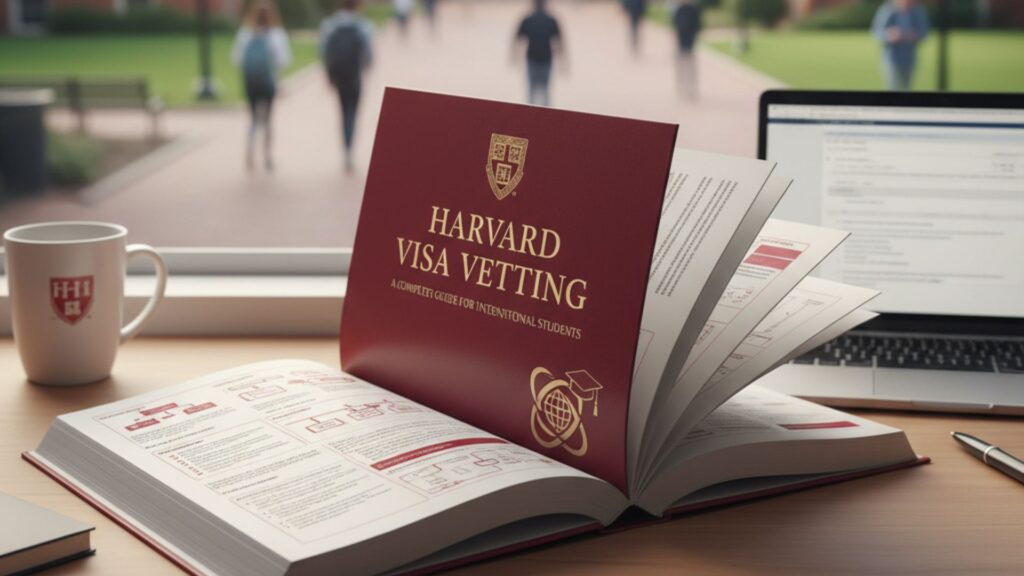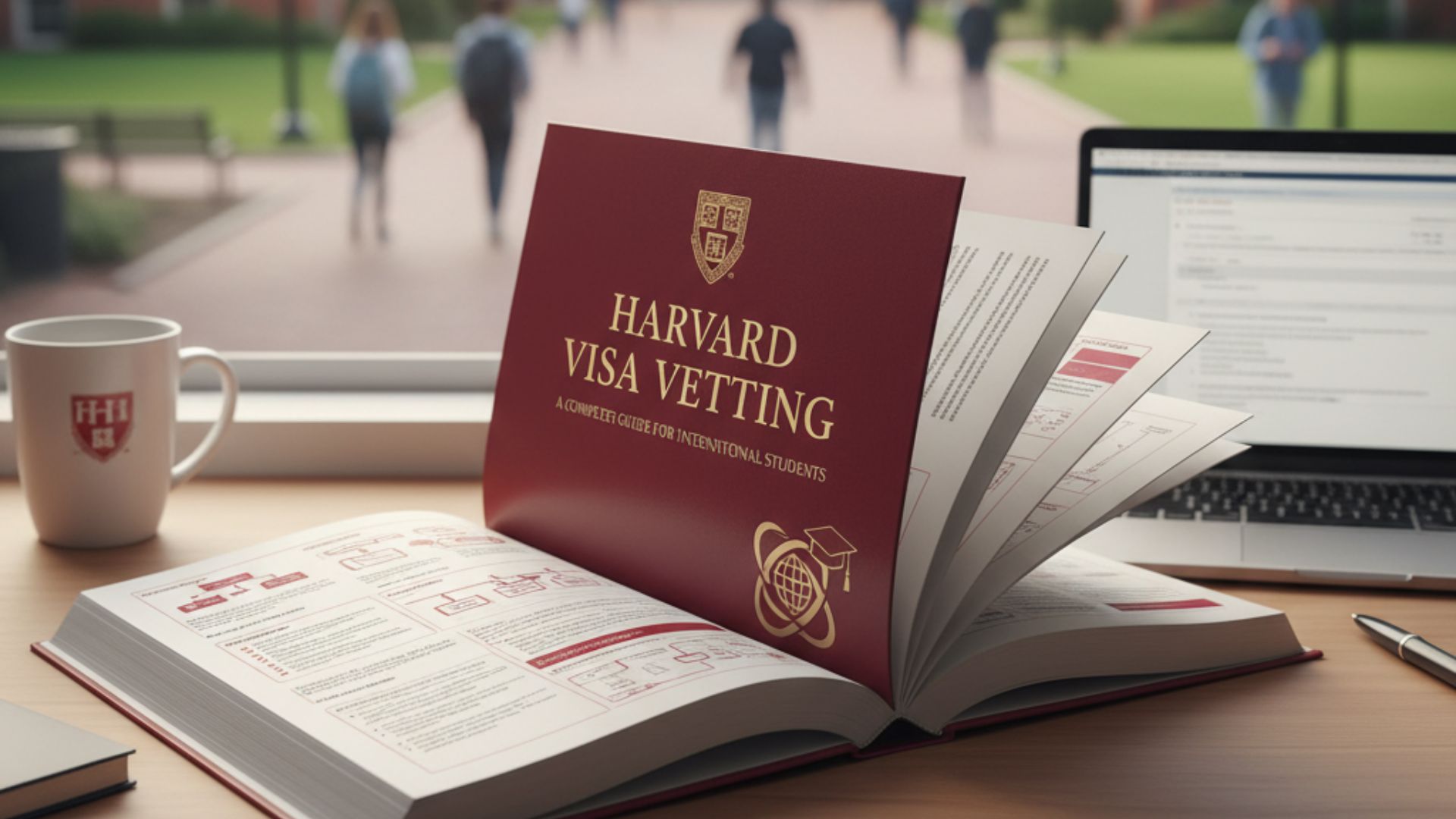Harvard Visa Vetting: Harvard University stands as a symbol of academic excellence, innovation, and diversity. Each year, thousands of international students aspire to join its programs, bringing unique perspectives from around the globe. However, gaining admission is only part of the journey. International students must also undergo a detailed visa vetting process, a crucial step to ensure compliance with U.S. immigration laws and Harvard’s admission requirements.
The Harvard visa vetting process involves more than just obtaining a student visa. It includes several stages of verification, document submission, background checks, and coordination between the student, Harvard’s International Office, and the U.S. Department of State. Understanding this process is essential for every international applicant planning to study at Harvard.

This article provides a comprehensive overview of Harvard’s visa vetting procedures, including the steps involved, required documentation, important policies, and practical tips for a smooth transition to the United States.
What Is Harvard Visa Vetting?
Visa vetting refers to the verification and evaluation process conducted by both Harvard University and U.S. immigration authorities to ensure that international students meet the eligibility and legal requirements to study in the United States.
At Harvard, visa vetting typically involves:
- Verification of admission and enrollment status.
- Review of financial documents proving the ability to fund education and living expenses.
- Issuance of visa eligibility documents such as Form I-20 (for F-1 visas) or DS-2019 (for J-1 visas).
- Coordination with the Harvard International Office (HIO) for guidance on the student visa application process.
- Compliance with federal security and background checks.
Steps in the Harvard Visa Vetting Process
1. Admission Confirmation
Before starting the visa process, applicants must receive an official offer of admission from Harvard University. Once accepted, the student must confirm enrollment and provide necessary details for the issuance of the visa eligibility document.
2. Issuance of Form I-20 or DS-2019
After confirming enrollment, international students receive one of the following forms depending on their program:
- Form I-20: For students applying for the F-1 visa.
- Form DS-2019: For students applying for the J-1 visa (Exchange Visitor Program).
The Harvard International Office issues these forms after reviewing proof of financial support and other required documentation.
3. Payment of SEVIS Fee
Students must pay the SEVIS (Student and Exchange Visitor Information System) fee before scheduling a visa interview. This fee supports the maintenance of the U.S. student tracking system.
4. Visa Application and Interview
With the I-20 or DS-2019 and proof of SEVIS payment, students can schedule an appointment at a U.S. Embassy or Consulate. The visa interview includes questions about academic goals, financial capability, and ties to the home country.
5. Background and Security Checks
Visa vetting also involves background checks conducted by the U.S. Department of State and other federal agencies. These checks ensure the student does not pose any security risks. Certain applicants, especially those in sensitive research fields, may experience additional administrative processing.
6. Visa Approval and Entry to the U.S.
Once approved, students receive their F-1 or J-1 visa stamped in their passport. They can enter the U.S. up to 30 days before their program start date as indicated on their I-20 or DS-2019.
7. Arrival and Check-in with the Harvard International Office
Upon arrival, students must check in with the Harvard International Office (HIO) to validate their SEVIS record and maintain legal status. The HIO assists with orientation, immigration regulations, and visa maintenance throughout the student’s stay.
Key Documents Required for Harvard Visa Vetting
| Document | Purpose | Issued By | Notes |
|---|---|---|---|
| Admission Letter | Proof of acceptance to Harvard University | Harvard University | Must be official and recent |
| Form I-20 or DS-2019 | Proof of visa eligibility | Harvard International Office | Required for F-1 or J-1 visas |
| Passport | Identification and travel document | Home country government | Must be valid for at least 6 months beyond stay |
| SEVIS Fee Receipt | Proof of SEVIS fee payment | SEVP system | Mandatory before visa interview |
| Financial Documents | Proof of funds for tuition and living | Student/Parent/Scholarship provider | Bank statements, sponsor letters accepted |
| Visa Application Form (DS-160) | Official U.S. visa application | U.S. Department of State | Completed online |
| Visa Appointment Confirmation | Proof of interview schedule | U.S. Embassy or Consulate | Must be printed for entry |
| Health and Immunization Records | Compliance with health requirements | Student | May be required by Harvard before arrival |
Harvard’s Role in the Visa Vetting Process
Harvard’s responsibility in visa vetting goes beyond document issuance. The Harvard International Office (HIO) ensures that all international students are supported throughout the visa process. The office helps with:
- Advising students on the appropriate visa category (F-1 or J-1).
- Issuing and updating visa-related forms.
- Providing pre-arrival information and orientation.
- Ensuring compliance with U.S. immigration regulations.
- Assisting with travel signatures, visa renewals, and extensions.
- Offering workshops and guidance for maintaining lawful status.
The HIO acts as the primary liaison between the student and federal agencies, ensuring that Harvard’s international community remains compliant and well-informed.
Common Challenges in Harvard Visa Vetting
While the visa vetting process is straightforward for most students, some may face challenges such as:
- Administrative Delays: Background checks or additional document verification can delay visa issuance.
- Financial Proof Issues: Insufficient or unclear financial documentation may lead to rejection or request for additional evidence.
- Timing Problems: Applying too late can result in missing orientation or the start of classes.
- Visa Denials: Rare but possible if the applicant fails to demonstrate academic intent or financial stability.
- Travel Restrictions: Political or global health situations may temporarily affect visa processing.
Students are encouraged to start the visa process early and maintain close communication with the HIO to avoid these issues.
Maintaining Visa Status at Harvard
Once the visa is approved and the student arrives in the U.S., it is essential to follow visa regulations to maintain legal status. Key responsibilities include:
- Maintaining full-time enrollment during academic terms.
- Reporting address changes to the HIO within 10 days.
- Not working off-campus without authorization.
- Keeping the I-20 or DS-2019 valid at all times.
- Attending regular visa check-ins and workshops.
Failure to comply with visa rules may lead to termination of SEVIS records, jeopardizing the student’s legal stay.
Important Links and Information
| Category | Description | Link / Contact |
|---|---|---|
| Harvard International Office (HIO) | Provides visa and immigration support for international students | https://hio.harvard.edu |
| SEVIS Fee Payment | Official SEVIS I-901 payment system | https://fmjfee.com |
| U.S. Visa Application Form (DS-160) | Online nonimmigrant visa form | https://ceac.state.gov/ |
| U.S. Embassy and Consulate Locator | Find your nearest visa interview location | https://usembassy.gov |
| Harvard University Admissions | General admissions information | https://www.harvard.edu/admissions/ |
| Health and Immunization Requirements | Harvard health compliance information | https://huhs.harvard.edu |
Tips for a Smooth Harvard Visa Vetting Experience
- Start Early: Begin gathering documents and scheduling interviews as soon as you receive your I-20 or DS-2019.
- Keep Copies of All Documents: Maintain digital and physical copies of your visa, passport, and forms.
- Stay in Touch with the HIO: The HIO offers continuous guidance on visa-related questions.
- Prepare for the Interview: Practice explaining your academic goals, financial situation, and reasons for choosing Harvard.
- Monitor Visa Processing Times: Check embassy websites regularly to avoid last-minute issues.
- Plan Your Travel: Arrive within the legal entry period (no earlier than 30 days before program start).
- Stay Compliant: Follow all immigration and academic requirements once at Harvard.
FAQ about Harvard Visa Vetting
Does Harvard University assist students with visa applications?
Yes, Harvard’s International Office (HIO) provides complete assistance, including form issuance, documentation review, and visa compliance support.
What type of visa is required to study at Harvard?
Most full-time degree students apply for an F-1 visa, while exchange or sponsored students may need a J-1 visa.
How long does the visa vetting process take?
The timeline varies but typically ranges from 4 to 8 weeks, depending on embassy processing times and background checks.
What happens if my visa is delayed or denied?
Students should immediately inform the HIO, which can provide guidance, documentation updates, or deferral options.
Can I work while studying at Harvard under my visa?
Yes, F-1 and J-1 students may work on-campus up to 20 hours per week during the academic term, with proper authorization.
What is the role of SEVIS in the visa vetting process?
SEVIS tracks all international students and exchange visitors in the U.S. to ensure compliance with immigration regulations.
Can my family accompany me on a student visa?
Yes, dependents of F-1 and J-1 students can apply for F-2 or J-2 visas, respectively.
Conclusion
The Harvard visa vetting process is a critical part of an international student’s journey to one of the world’s most prestigious universities. It ensures that all students entering the United States meet academic, legal, and financial requirements while maintaining national security standards.
By understanding each step — from admission to arrival — and working closely with the Harvard International Office, students can navigate the process smoothly and confidently.
Harvard’s commitment to supporting its global community ensures that students from every part of the world can pursue excellence in education, research, and leadership. Proper preparation, timely action, and adherence to visa regulations will not only make the process easier but also pave the way for a successful and enriching academic experience at Harvard University.

